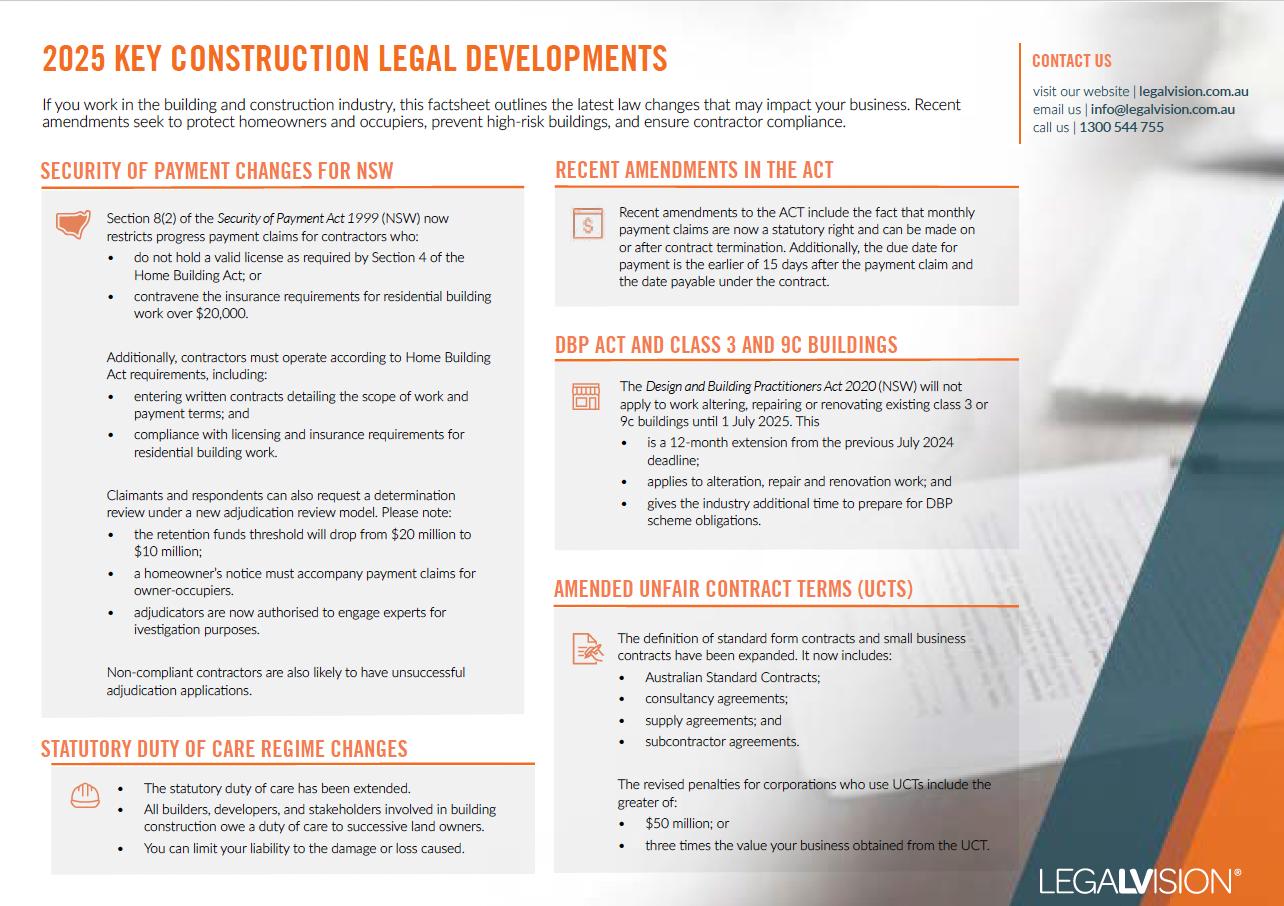In Short
-
The Building Code 2016 has been repealed, removing certain industrial relations obligations for construction projects.
-
The ABCC has been abolished, changing compliance requirements for construction companies.
-
Construction businesses should review their practices to align with the new regulatory framework.
Tips for Businesses
Construction companies should reassess compliance strategies following recent changes to regulations. Staying informed and consulting legal experts will help navigate the updated requirements.
Australia’s construction sector underwent a significant change following the Federal Government’s introduction of substantial reforms to repeal the Code for the Tendering and Performance of Building Work 2016 (Cth) (‘Building Code 2016’) and abolish the Australian Building and Construction Commission (‘ABCC’). This article will assist you in navigating those changes.
Abolishment of the ABCC and Repeal of the Building Code 2016
The Building Code 2016 aimed to establish superior industrial relations standards among contractors engaged in Commonwealth-funded building and construction projects. Imposing a series of obligations, it sought to streamline operations and ensure adherence to high industry benchmarks, intending to foster transparency, compliance, and fairness within the sector.
While the Amendment marked a critical shift, the full repeal of the Code was still contingent upon the repeal of the Building and Construction Industry (Improving Productivity) Act 2016 (‘BCIIP Act’).

If you work in the building and construction industry, this factsheet outlines the latest law changes that may impact your business.
The Fair Work Legislation Amendment (Secure Jobs, Better Pay) Act 2022
The Fair Work Legislation Amendment (Secure Jobs, Better Pay) Act 2022 (‘SJBP Act’) received Royal Assent on December 6, 2022. The SJBP Act:
- repealed Chapter 3 of the BCIIP Act, thereby triggering a substantial repeal of the Building Code 2016; and
- abolished the ABCC, renaming the BCIIP Act as the Federal Safety Commissioner Act 2022.
Effective on and from February 6, 2023. Despite the substantial reduction in substantive provisions, certain obligations remain intact. These include:
- conducting labour market testing for engaging non-citizens or non-residents in building work;
- ensuring specific information is provided by preferred tenderers before engaging in Commonwealth-funded building work contracts; and
- mandating compliance with Australian standards for building work products.
Importantly, Chapter 4 of the BCIIP Act (The Federal Safety Commissioner) and the Building and Construction Industry (Improving Productivity) (Accreditation Scheme) Rules 2019 (Cth) remain in force and are not impacted by the SJBP Act.
Funding Entities should continue to apply the WHS Accreditation Scheme requirements of the BCIIP Act and the Accreditation Scheme Rules where appropriate.
Continue reading this article below the formNavigating the Transitional Landscape
The sector’s transition to this revised landscape requires meticulous assessment, adaptation, and alignment with the amended legislative framework ushered in by the Amendment. Generally, stakeholders must recalibrate operational frameworks, contracts, and compliance mechanisms to align with the updated obligations and industry standards.
Key Takeaways
The SJBP Act’s reforms mark a pivotal moment in Australia’s construction industry. Stakeholders must navigate this transformational phase with diligence, adaptability, and a keen understanding of the revised legislative landscape to ensure sustained integrity, compliance, and operational efficiency within the redefined regulatory ambit.
If you have any questions, our experienced construction lawyers can assist as part of our LegalVision membership. For a low monthly fee, you will have unlimited access to lawyers to answer your questions and draft and review your documents. Call us today on 1300 544 755 or visit our membership page.
Frequently Asked Questions
The repeal of the Building Code 2016 and the abolition of the Australian Building and Construction Commission (ABCC) introduced significant changes to the construction sector. These include reduced obligations for Workplace Relations Management Plans and fewer subcontractor compliance requirements. However, some compliance obligations, such as labour market testing, remain in place.
Some obligations remain despite the abolition of the ABCC and repeal of the Building Code 2016. These include labour market testing for non-citizens, providing specific information when tendering for Commonwealth-funded projects, and complying with Australian building standards. The Federal Safety Commissioner’s role and WHS Accreditation Scheme requirements also continue to apply.
We appreciate your feedback – your submission has been successfully received.











